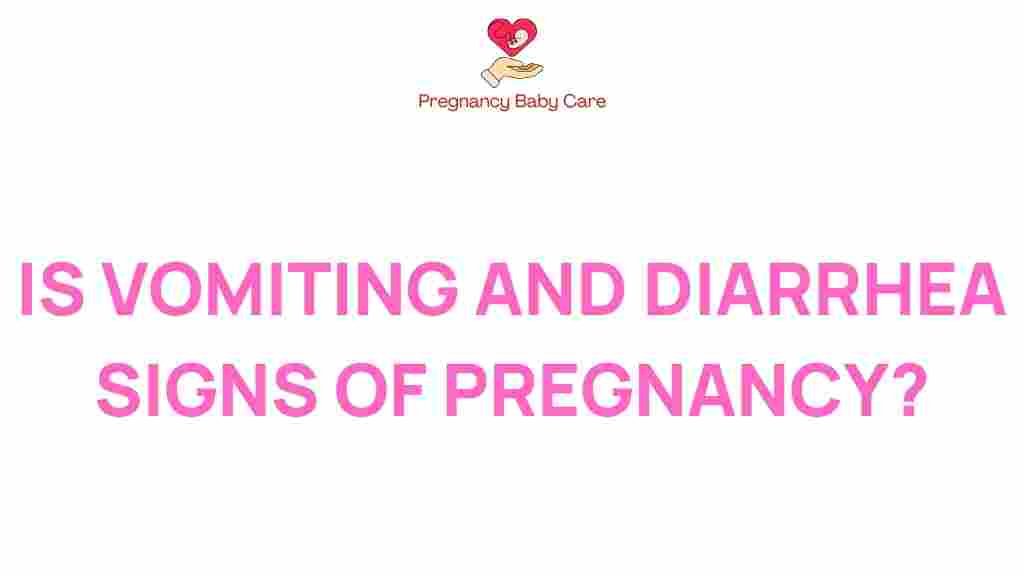Unraveling the Mystery: Is Vomiting and Diarrhea a Sign of Pregnancy?
When it comes to early signs of pregnancy, many women are familiar with common symptoms such as missed periods, breast tenderness, and fatigue. However, there is another group of symptoms that can be confusing and concerning: vomiting and diarrhea. Understanding the connection between these digestive issues and pregnancy can help alleviate anxiety and ensure proper prenatal care. In this article, we will explore whether vomiting and diarrhea are indeed signs of pregnancy and discuss the health concerns that may arise.
Understanding Early Signs of Pregnancy
Pregnancy symptoms can vary widely from woman to woman. Some may experience multiple symptoms, while others might have none at all. The most commonly recognized early signs of pregnancy include:
- Missed period
- Nausea and vomiting (morning sickness)
- Breast tenderness
- Fatigue
- Frequent urination
While nausea is often linked to pregnancy, the presence of diarrhea can create confusion. It’s essential to differentiate between typical early pregnancy symptoms and other health concerns that may lead to gastrointestinal distress.
Link Between Digestive Issues and Pregnancy
Vomiting and diarrhea can occur for various reasons, including:
- Hormonal changes
- Dietary changes
- Stress and anxiety
- Infections
- Food intolerances
During the early stages of pregnancy, hormonal fluctuations can significantly affect a woman’s digestive system. The surge in hormones, particularly human chorionic gonadotropin (hCG) and progesterone, can lead to nausea and vomiting. However, these hormones might also slow down the digestive process in some women, potentially leading to constipation rather than diarrhea.
When Is Vomiting and Diarrhea a Cause for Concern?
While some degree of nausea and vomiting is common in early pregnancy, persistent vomiting and diarrhea can signal underlying health concerns. If these symptoms are severe or prolonged, they may lead to dehydration and other complications that can affect maternal health. It is essential to be aware of when to seek medical attention:
- Vomiting that lasts more than a few days.
- Severe abdominal pain.
- Signs of dehydration (e.g., excessive thirst, dry mouth, dizziness).
- Diarrhea that persists for more than 24 hours.
If you experience any of these symptoms, it is crucial to consult a healthcare provider to rule out any serious conditions.
Steps to Take If You Experience Vomiting and Diarrhea
If you are experiencing vomiting and diarrhea, follow these steps to manage your symptoms and ensure your health:
1. Stay Hydrated
Dehydration is a significant risk during episodes of vomiting and diarrhea. Focus on:
- Drinking clear fluids such as water, broth, or electrolyte solutions.
- Avoiding caffeine and sugary drinks, which can worsen dehydration.
2. Monitor Your Symptoms
Keep track of the frequency and severity of your vomiting and diarrhea. Note any additional symptoms such as:
- Fever
- Blood in stool or vomit
- Severe abdominal cramping
3. Adjust Your Diet
When your symptoms begin to ease, gradually reintroduce food. Start with:
- BRAT diet (Bananas, Rice, Applesauce, Toast)
- Plain crackers
- Steamed vegetables
4. Consult a Healthcare Provider
If your symptoms persist or worsen, it’s essential to seek medical advice. A healthcare provider can offer guidance on managing symptoms and may perform tests to rule out other conditions.
5. Pregnancy Testing
If you suspect you might be pregnant, consider taking a home pregnancy test. These tests detect hCG in urine and can provide early confirmation of pregnancy. If the test is positive and you are experiencing digestive issues, make an appointment with your healthcare provider for further evaluation.
Common Health Concerns Related to Vomiting and Diarrhea in Pregnancy
Several health concerns can arise from vomiting and diarrhea during pregnancy:
- Hyperemesis Gravidarum: A severe form of nausea and vomiting that can lead to weight loss and dehydration.
- Gastroenteritis: An infection that can cause diarrhea and vomiting, leading to dehydration.
- Foodborne Illness: Pregnant women are more susceptible to certain foodborne illnesses, which can result in digestive issues.
It’s vital to stay informed about these conditions and discuss any concerns with your healthcare provider.
Conclusion
In conclusion, while vomiting and diarrhea can occur during early pregnancy, they are not definitive signs of pregnancy. These symptoms can be attributed to various factors, including hormonal changes, dietary shifts, or infections. Proper management and monitoring of your health are crucial to ensure both maternal and fetal well-being. If you have concerns about your symptoms or suspect you may be pregnant, consult with your healthcare provider for personalized advice and care.
For more information on early pregnancy symptoms and maternal health, visit World Health Organization for guidelines and resources. Also, check out our article on common digestive issues during pregnancy for further insights.
This article is in the category Pregnancy and created by PregnancyBabyCare Team
